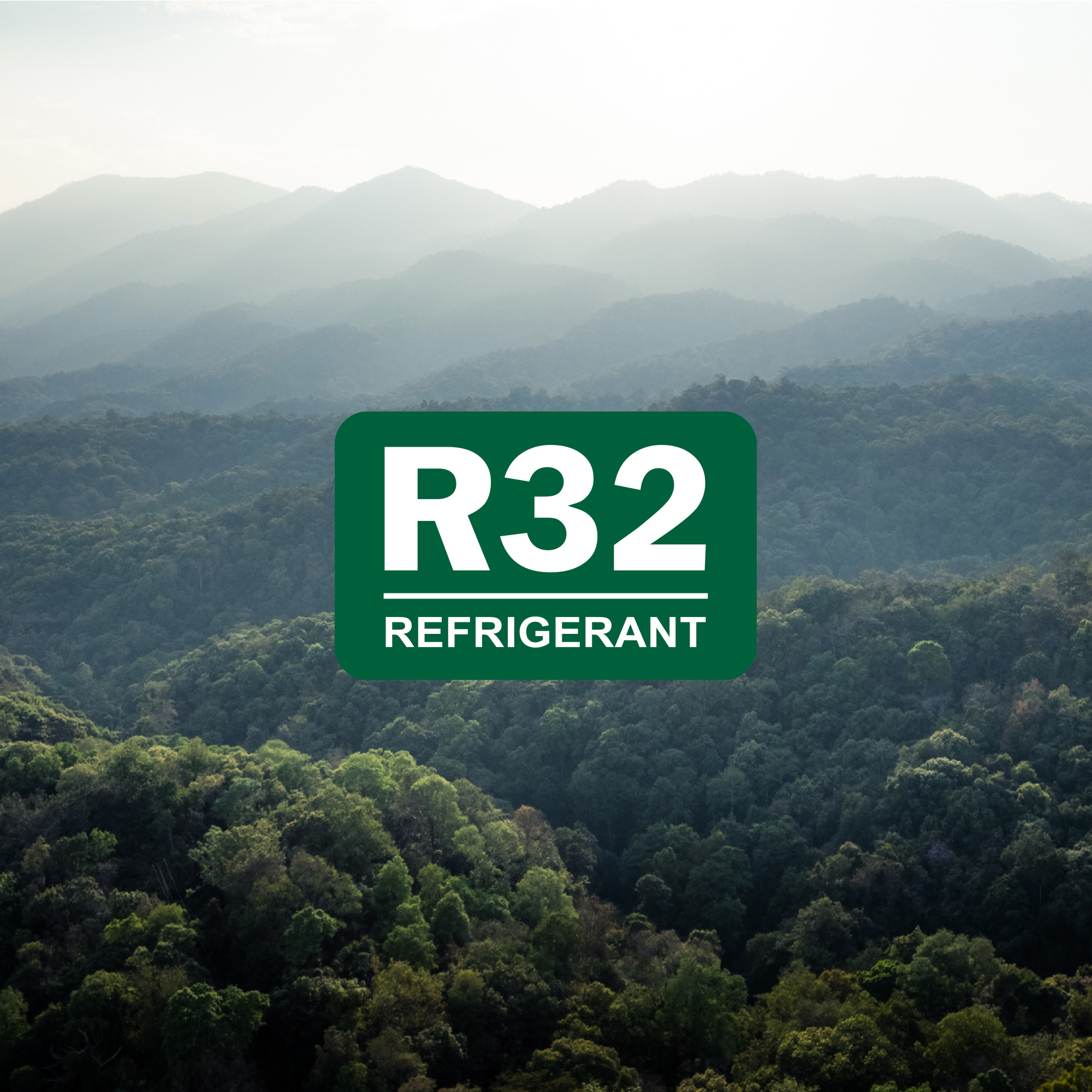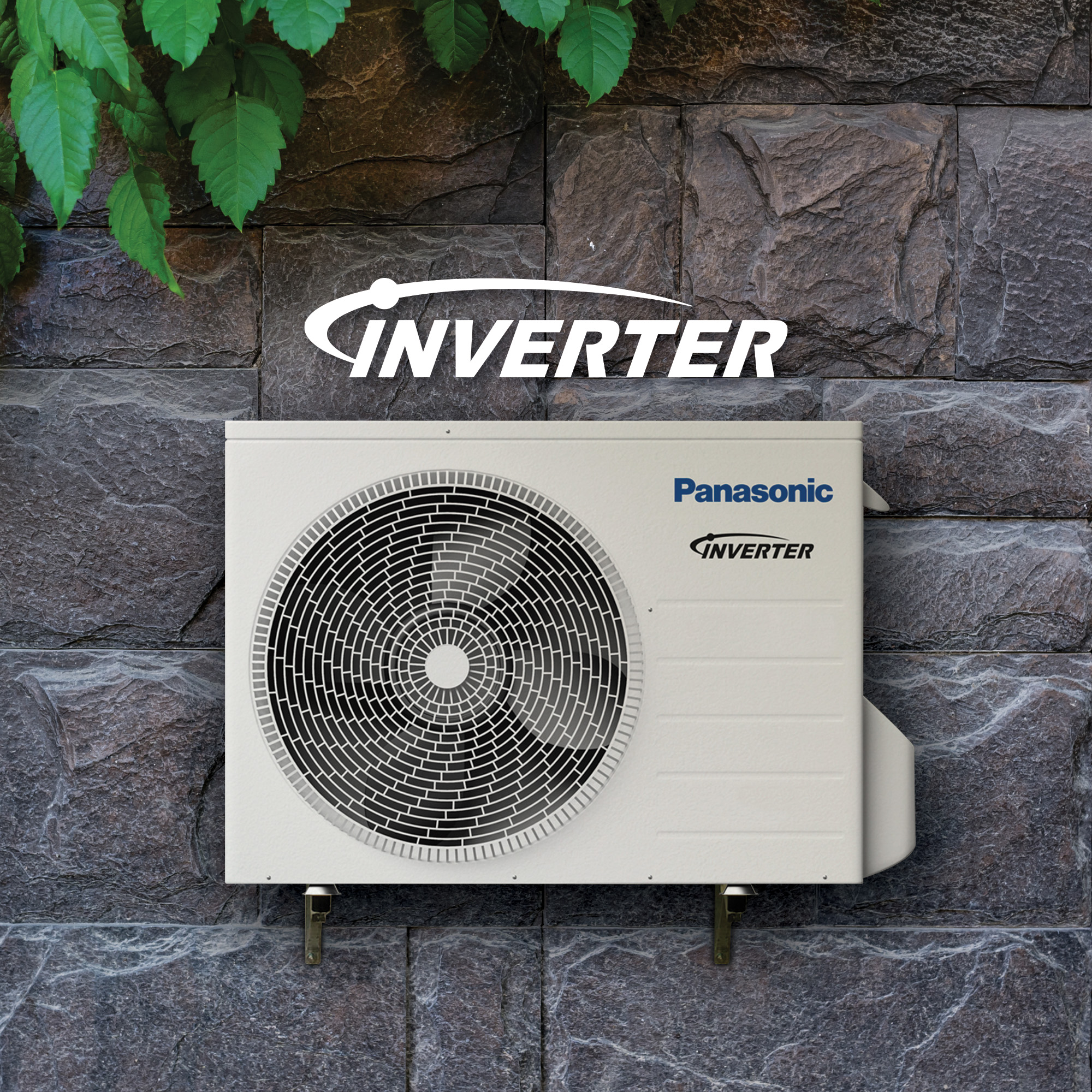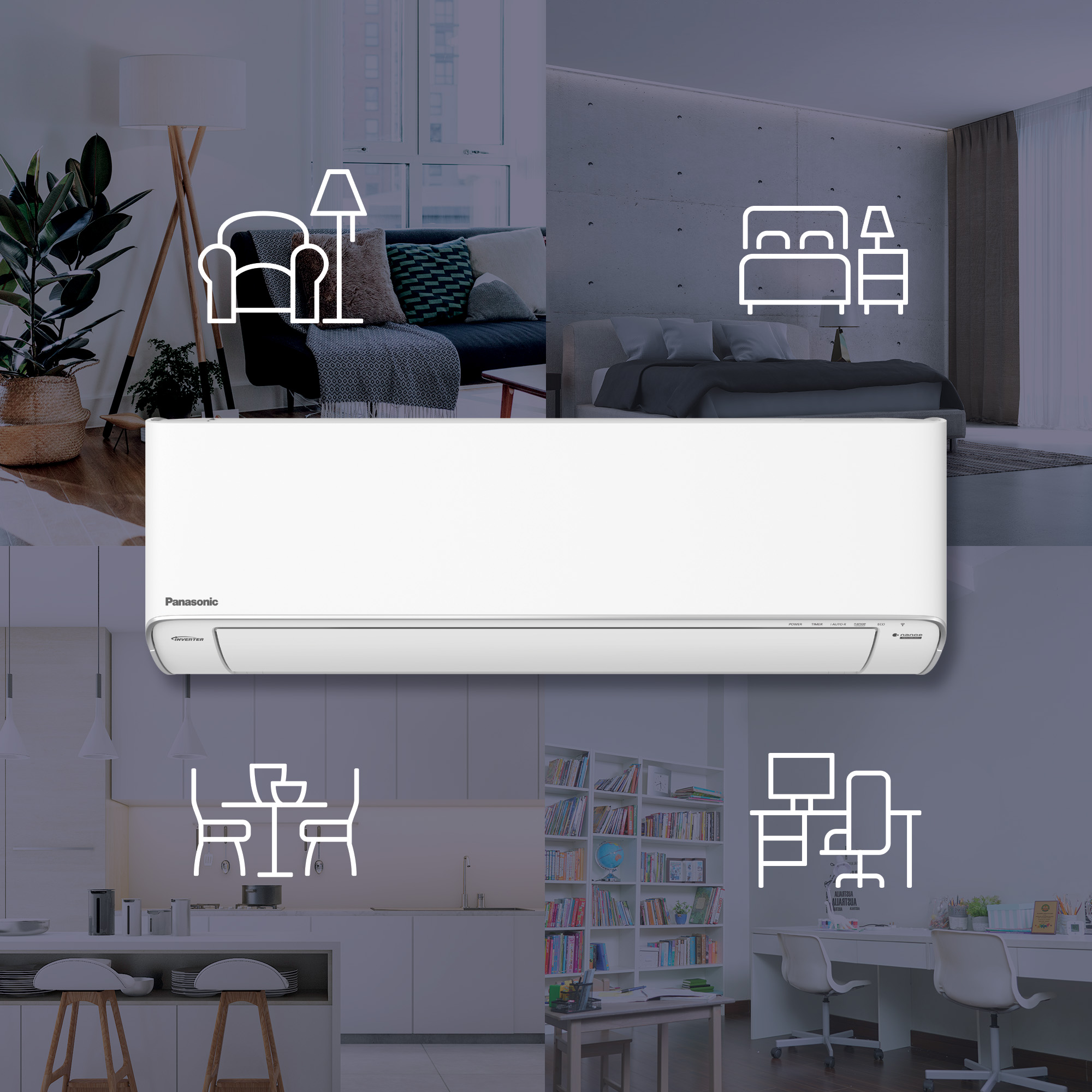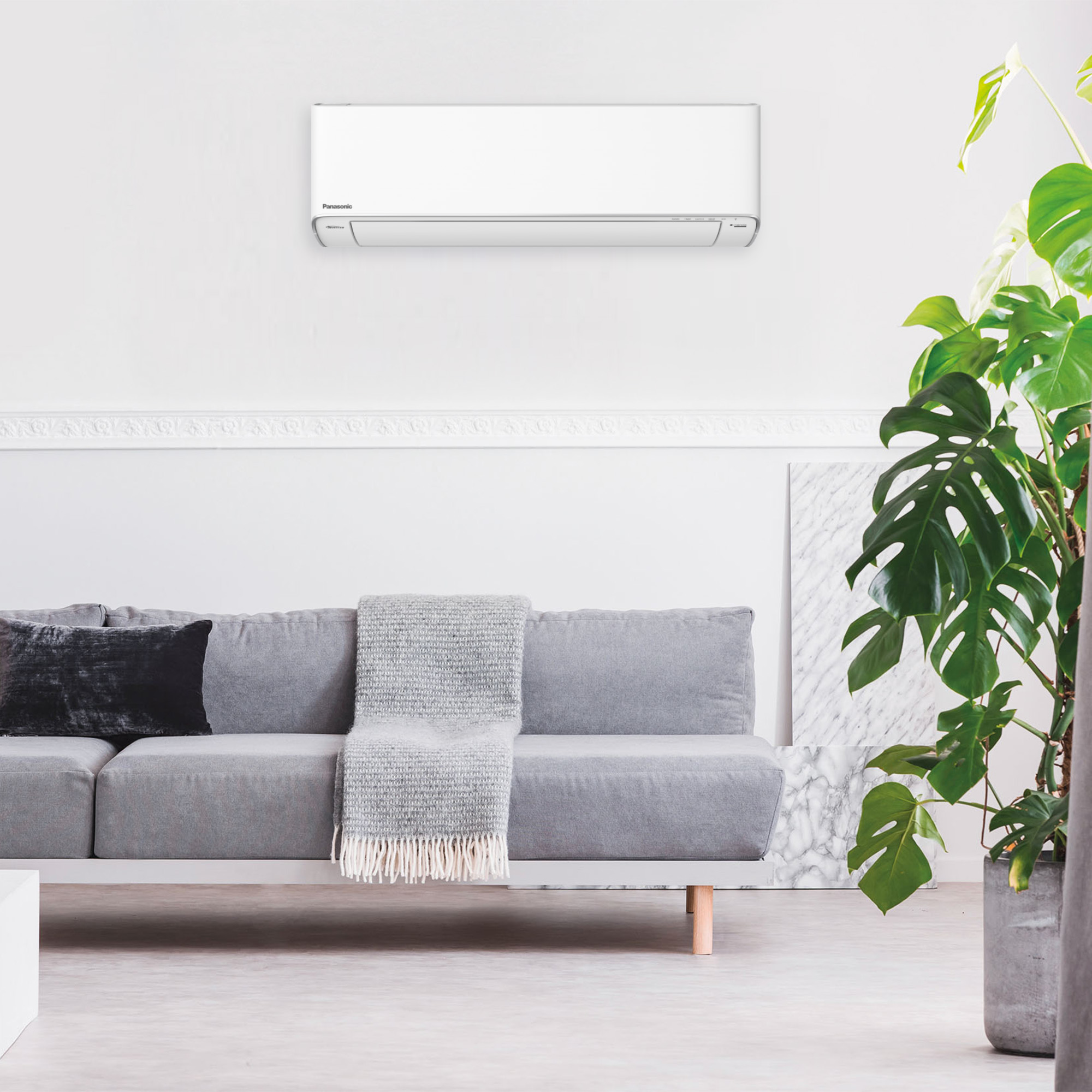
Eco-friendly Technologies
Make smarter, greener choices with energy saving technologies for sustainable living.

ECO A.I. Technology
Intelligently balances energy savings and comfort.

INVERTER Technology
Precise temperature control.

Sustainable Refrigerant, R32
An environmentally-friendly refrigerant.

Cooling Seasonal Performance Factor (CSPF)
High Cooling Seasonal Performance Factor.
ECO A.I. Technology*
The Panasonic ECO Mode with Artificial Intelligence (A.I.) Control learns about your room environment. Energy saving is maximised in each room’s environment as it auto-adjusts to the optimal ECO level based on heat load conditions and air conditioning capacity.

Automatically adapts to your home and maximises energy savings
As each room in your home is different, ECO Mode with A.I. Control efficiently cools your room based on the
amount of heat load contained. It finds the perfect ECO balance between power consumption and time taken to
reach the desired temperature to maintain your comfort with minimal energy waste.
ECO Mode with A.I. Control will automatically learn and judge what is the optimal ECO level based on:
1 Room condition
2 Heat Source can be due to:
(A) Sunlight and lighting in the room
(B) Computers and appliances
(C) Body heat

When Your Air Conditioner is Switched On
Scenario : Daytime with sunlight in a big warm room, require Fast Cooling.
ECO Mode with A.I. prioritises on maximising cooling comfort while saving energy through ECO Mode.
When Your Air Conditioner is Switched On
Scenario : Night time with cool breeze.
ECO Mode with A.I prioritises on maximising energy savings over cooling comfort.


After Reaching Set Temperature
Consistent comfort day or night. Saves energy after reaching set temperature.
ECO Mode with A.I continues to save energy and automatically adjusts room temperature for consistent cooling comfort.

* Comparison of ECO Mode & normal mode by using 1.5HP Inverter Model
ECO Mode:
ECO Mode, Outside temperature : 35°C/24°C
Remote setting temperature : 25°C, with Fan Speed: High.
Horizontal Airflow direction : Middle
Vertical Airflow direction : Straight
Normal Mode:
Normal Mode, Outside temperature : 35°C/24°C
Remote setting temperature : 25°C, with Fan Speed: High.
Horizontal Airflow direction : Middle
Vertical Airflow direction : Straight
Total power consumption amount is measured for 1 hour under stable operation.
At Panasonic Amenity Room (size : 13.3㎡)
The effect differs according to conditions in installation and usage

How to switch on ECO Mode
with A.I. Control
Energy Saving & Precise Temperature Control
Panasonic's INVERTER reduces power consumption by varying the speed of the compressor according to temperature changes with the aim of minimising the temperature fluctuations so you can enjoy consistent cooling comfort.

Remark: Energy is wasted by switching the compressor ON and OFF to maintain the set temperature.
NON-INVERTER
A conventional non-INVERTER air conditioner can only operate at a constant speed which is too powerful to maintain the set temperature. Thus, it switches the compressor on and off repeatedly. This results in wider temperature fluctuations leading to wasteful consumption of energy.

Remark: Saves energy by varying the rotation speed of the compressor to maintain the set temperature.
INVERTER
The Panasonic INVERTER air conditioner varies the rotation speed of the compressor, providing a precise method of maintaining the set temperature. Thus, Panasonic INVERTER air conditioners give you exceptional energy saving performance while ensuring you stay comfortable at all times.
How It Works
The principle is much like driving a car. It is more comfortable to drive a car when there is no need to repeat start-and-stop operations.

Non-Inverter
Excess consumption of fuel due to frequent restarting of motor.

Inverter
Efficient management of energy by keeping motor running at varying speeds.
Energy Saving with Inverter
Panasonic Inverter air conditioners give you exceptional energy saving performance while ensuring you stay comfortable at all times.
Inverter prevents wasteful energy consumption by varying the compressor rotation speed to maintain the set temperature.


The “BRAIN” of the Inverter - The Micro Computer
Determines the most suitable operation mode as time passes and automatically adjusts power output for maximum comfort.

P-TECH* – THE POWER BEHIND FAST COOLING
P-TECh enables the compressor to achieve maximum frequency in the shortest time from start up, giving you powerful cooling the moment the air conditioner is switched on.
PAM (Pulse Amplitude Modulation) – Quick Cooling and Constant Comfort
PAM (Pulse Amplitude Modulation) increases the power output to accelerate compressor speed at start up to Modulation) deliver powerful cool air. Once the set temperature is reached, PWM (Pulse Width Modulated Wave) controls the compressor speed to maintain the set temperature for comfortable ambiance without wasting energy.



PWM (Pulse Width Modulated Wave)
Stabilises the compressor rotation speed when maintaining the set temperature, like putting a car on cruise control.
An Environmentally-friendly Refrigerant
The commonly used refrigerants in air conditioning system contribute greatly to greenhouse gas emissions and ozone depletion, consequently putting our environment at stake. At Panasonic, we are committed to healthier lifestyles and to reducing our environmental footprint. That's why our air conditioners have been increasingly adopting the more eco-friendly R32 refrigerant.
R32 refrigerant represents innovation in every way. It is an excellent heat transfer medium which leads to greater energy efficiency and cost effectiveness. R32 refrigerant also has low global warming potential, hence it's friendlier to the environment


R32 has higher cooling capacity thereby increases heat transfer efficiency.

It consumes less energy, helping youto save on electricity costs.

R32 has zero impact on the ozone layer, therefore it’s environment friendly.
What is R32?

REFRIGERANT PROPERTIES OF R22, R32, and R410A

The New Ratings Based on Seasonal Energy Efficiency
Panasonic Air Conditioners not only achieved high EER for rated operations, but also with a high Cooling Seasonal Performance Factor - a more realistic energy efficiency measurement based on customer’s actual environment of use over an entire year.

CSPF ratings measure annual energy consumption and efficiency, taking into account temperature fluctuations and standby periods to give more accurate and realistic indications of typical energy efficiency over an entire cooling season.
Definition of Cooling Seasonal Performance Factor (CSPF)
Ratio of the total amount of heat that the equipment can remove from the indoor air when operated for cooling during the cooling season to the total amount of energy consumed by the equipment during the same period.
Calculating CSPF
The equipment shall be calculated by equation.

Cooling Seasonal Total Load (CSTL)
Total amount of heat that is removed from the indoor air when equipment is operated for cooling the building during the cooling season.
Cooling Seasonal Energy Consumption (CSEC)
Total amount of energy consumed by the equipment when it is operated for cooling during the cooling season.
The Advantages of Seasonal Efficiency VS Rated Efficiency
|
Factor |
Nominal |
CSPF |
|---|---|---|
|
Temperature |
One point of temperature conditions, |
Adopts several rating temperatures for cooling, |
|
Cooling Capacity |
Calculates based on full capacity. Hence, difficult |
Integrate operations at partial load instead of full |
Disclaimer
* Applicable for models with ECO+A.I. function only.




